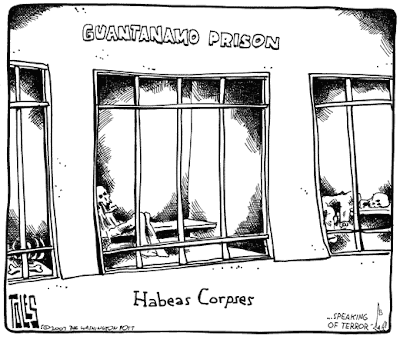H.R. 1955 - one more foot in the door?
 On November 12th, I posted "Why aren't we hearing more about H.R. 1955..?" Known as the Violent Radicalization and Homegrown Terrorism Prevention Act of 2007, it is now receiving some attention:
On November 12th, I posted "Why aren't we hearing more about H.R. 1955..?" Known as the Violent Radicalization and Homegrown Terrorism Prevention Act of 2007, it is now receiving some attention:
1. On November 19th the Baltimore Sun published "Here Come the Thought Police," an excellent description of H.R. 1955, which sailed through the House with a 404 –6 vote and is expected to be swiftly approved by the Senate.
2. On November 20th, Amy Goodman covered Homegrown Terrorism Prevention Act Raises Fears of New Government Crackdown on Dissent on Democracy Now. “A little-noticed anti-terrorism bill quietly making its through Congress is raising fears of a new affront on activism and constitutional rights….Critics say it could herald a new government crackdown on dissident activity and infiltration of universities under the guise of fighting terrorism. The bill would establish two government-appointed bodies to study, monitor and propose ways of curbing what it calls homegrown terrorism and extremism in the United States….
“Critics say the bill's definition of 'extremism' and 'terrorism' is too vague and its mandate even more broad. Under a false veil of expertise and independence, the government-appointed commissions could be used as ideological cover to push through harsher laws.”
Amy interviewed Jessica Lee, reporter for the Indypendent and Kamau Karl Franklin, Racial Justice Fellow at the NY-based Center for Constitutional Rights.
3. The Center for Constitutional Rights has a factsheet on H.R. 1955. Because everyone believes that the Senate will pass the bill, the focus is on the commission(s) that the bill establishes. The factsheet states, “The act claims to set up a Commission for a study that will ‘examine and report upon the facts and causes’ of so called violent radicalism and extremist ideology then make legislative recommendations on combating it.
"If we are lucky the commission will just be a way for Congress and committee members to have a few meetings in expensive hotels and work on their tan. However the greater fear should be the possible future outcomes of any report, which will focus in on passing additional federal criminal penalties that are sweeping and inclusive in criminalizing dissent and protest work more surveillance on thought rather than on actions. Further this bi-partisan attempt can set the ground for an even more acquiescent Congress to presidential power, never wanting to look weak on terrorism.”
The factsheet also notes Rand Corporation influence: “Brian Michael Jenkins, Rand Corporation’s so-called counterterrorism expert, testified on the Violent Radicalism hearings.”
Jenkins has written several books on terrorism, including Unconquerable Nation: Knowing Our Enemy, Strengthening Ourselves. On terrorism, Jenkins says, “In their international campaign, the jihadists will seek common grounds with leftist, anti-American, and anti-globalization forces, who will in turn see, in radical Islam, comrades against a mutual foe.”
My concerns:
1. “Violent radicalization” and “homegrown terrorism” are too loosely defined in the bill. The planned use of force and or threatened use of force by a group or individual are included. What is “force”? H.R. 1955 could be used to stifle dissent, especially of those who are viewed as “leftist, anti-American, and anti-globalization.”
2. The findings at Sec. 899B (3) that “The Internet has aided in facilitating violent radicalization, ideologically based violence and the homegrown terrorism process in the United States by providing access to broad and constant streams of terrorist-related propaganda to the United States.” Will our Internet access be curtailed?
3. The language of Section 899B (8) regarding the protection of our constitutional rights is vague.
4. How do we keep an eye on the commissions that are established to study violent radicalism and extremist ideology and make legislative recommendations? Given the 9/11 Commission’s track record, which I posted about here, I’ve concluded that the public has very little, if any, impact on federal commissions.
(photo: FBI)

